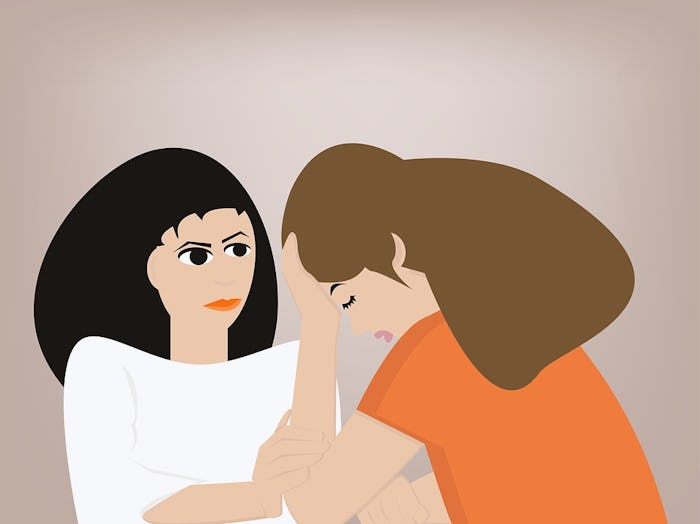Life

11 Things You Didn't Know Are Signs Of Postpartum Anxiety
Becoming a mother brings on many emotions and thoughts that you may have never experienced before. Some of these are enjoyable, like overwhelming love and connection. There are some instances, however, where the things you are feeling and thinking are your body's way of telling you there is a deeper issue at play. What may appear like common new parent problems can actually be a luring mood disorder. If you're not aware, the things you didn't know are signs of postpartum anxiety, or PPA, could be dismissed as new mom issues and never properly treated.
Just the name alone may cause your eyebrows to raise. Conditions like postpartum depression have received a lot more attention and research, but more and more professionals are realizing how many women are struggling with the anxiety side of postpartum mood disorders. As psychologist Jonathan Abramowitz told Parents magazine, postpartum anxiety is a hidden disorder, because it is often unrecognized and undiagnosed. This is due largely to the fact that it mimics the symptoms of generalized anxiety, and not given proper attention.
Persistent symptoms of worry and panic, coupled with physical manifestations like loos of appetite should not be brushed under the rug. If you're concerned you may have postpartum anxiety, take a look at these 11 signs that prove you're not just making things up.
1Difficulty Focusing
Having a new baby can definitely make you feel a little scattered, but there is a difference between mommy brain and a persistent problem staying focused. According to the website for the American Pregnancy Association (APA), if you have consistent trouble focusing and can't seem to snap out of it, it's a sign you might have postpartum anxiety.
2Extreme Body Temperatures
Sometimes, symptoms can take on extreme measures, but it's you're body's way of getting your attention. As Baby Center reported, one of the more physical symptoms of postpartum anxiety is experiencing flashes of hot and/or cold body temperature. If you notice a pattern of body temp changes, call your doctor to talk about the possibility of PPA.
3Sleep Problems
It may be hard to separate feeling tired with sleep problems, since new moms get such little sleep in the first year due to their baby waking. But if you just can't seem to sleep or struggle with insomnia, it might be a sign of postpartum anxiety, as Parents magazine suggested.
4Restlessness
Many new moms search for peace in the chaos of having a new baby, but when feelings of restlessness become more intense, it's time to take notice. When normal feelings of stress escalate to feeling out of control after becoming a new mom, it's a sign of postpartum anxiety, as Psychology Todaypointed out.
5Constant Worry
Many new moms miss this sign because worrying about your child is normal when becoming a parent. However, when a new mother experiences constant worry, it's a sign of postpartum anxiety, according to the website for Postpartum Support International. If you the worrisome thoughts start taking over, you should be in touch with your doctor.
6Second Guessing Yourself
Being indecisive is one thing, but constantly worrying that if you do something wrong your baby will be negatively effected is a sign of postpartum anxiety, according to U.S. News and World Report's website.
7Scary Thoughts About Baby
This symptom is one that some moms may just chalk up to being a rookie mama, thinking that they just don't have enough experience yet. However, you don't want to push this to the side once it starts to happen. The Center For Women's Mood Disorders on UNC School of Medicine's website reported that "repeated thoughts or images of frightening things happening to the baby," means you're experiencing postpartum anxiety.
8Lack Of Appetite
Not eating as much as you're used to can go hand-in-hand with different postpartum mood disorders. So pay attention if you are experiencing loss of appetite in conjunction with other postpartum anxiety symptoms, according to Postpartum Support International.
9Chest Pain
A physical response to anxiety can manifest in your chest area. According to the website for Pyschotherapy.com, feelings of pain in your chest are associated with women who have postpartum anxiety.
10Fear Of Criticism
As Baby Center pointed out, "you might worry excessively about being criticized for your parenting skills or about not having the support of friends and family." If these thoughts are taking up a good amount of mental real estate, it's a postpartum anxiety sign.
11Fear Of All Things Parenting
Even if you've never struggled with anxiety before, becoming a parent can trigger this response. As the website Psychotherapy.com cautioned, having an excessive amount of fear about your new role means PPA may have kicked in.